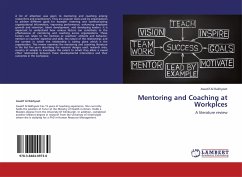A lot of attention was given to mentoring and coaching among researchers and practitioners. They are popular tools used by organizations to achieve different goals for example: reserving and communicating organizational information, improving performance, enhancing employee growth and retention, talent development, and developing leaders. It is important to understand how various factors can contribute to the effectiveness of mentoring and coaching across organizations. These factors can relate to the mentees or coachees attitude and behavior; mentors or coaches expertise and skills; the nature of the relationship; and the context in which the relationship is taking place which is the organization. This review examines the mentoring and coaching literature in the last five years describing the research designs used, research area, country of sample to investigate the extent to which they allow a causal effect relationship between these developmental interactions and their outcomes in the workplace.
Bitte wählen Sie Ihr Anliegen aus.
Rechnungen
Retourenschein anfordern
Bestellstatus
Storno








